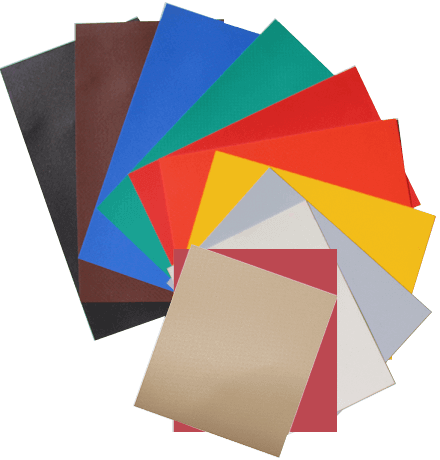Vinyl tarps are recommended for all applications that require a durable waterproof cover. Vinyl tarps offer the following key benefits:

Given all of these benefits, you might be wondering when you would not want to go with a vinyl tarp, let's go over some of these reasons.
If you are carrying your tarp on a long backpacking camping trip, chances are a vinyl tarp would be just too heavy. For applications like this wherein the weight of the tarp is a big consideration, a poly tarp might be your better choice. Weight is also a factor for very large tarps. This is why we always show you the weight of your tarp during the ordering process. You should always make note of the weight shown and make sure you can manoeuvre a tarp of the indicated weight.
Some applications require a breathable cover, that is, one that is porous to allow air to pass through. The main reason for using breathable materials is that non-porous materials such as vinyl can prevent evaporating moisture from escaping, thus resulting in condensation forming on the inside of the tarp.
As a cotton material, our canvas tarps are breathable but, unfortunately, this also means that they are not 100% waterproof. Therefore, for waterproof applications we always recommend vinyl tarps and in situations where condensation is a concern it is best to combat this by taking steps to ensure adequate air flow/circulation under the tarp. For example, rather than having all sides of the tarp drape onto the ground, you could make the tarp a little smaller to allow air to flow under the tarp to prevent condensation.
Vinyl tarps cost more than typical poly tarps but they also adhere to the old adage "You get what you pay for". Nevertheless, there may be times when the extra cost cannot be justified. Generally speaking, it pays to invest in a vinyl tarp if this is something you plan to use for several years. Let's say that you discover a leaky roof and it will take a few weeks to have it repaired. In a case like this, you can probably get away with a poly tarp and save yourself some money. On the other hand, if you won't be repairing your roof for a few months or years, the cost of a vinyl tarp is likely justified.
A white vinyl tarp will let a certain amount of sunlight through but generally speaking vinyl tarps are opaque. A such, our solid vinyl tarps are not suitable for application where you need to see through the tarp. In that case you will need to go with our clear vinyl tarp material. These are still made out of waterproof vinyl but they do not have the internal mesh scrim so they are not as strong and durable.
If the main consideration is light transparency (as opposed to visibility) you should consider our reinforced clear tarps. These are stronger than clear tarps and they let a significant amount of light through however the visibility through the tarp is blurred.
Some applications don't require a waterproof tarp. For example, if you plan to use your tarp to cover brush you take to the dump, your main concern is containment. For this application a mesh tarp is preferred over a solid tarp because it won't catch the wind to the same extent. On the other hand, if you plan to use the same tarp to keep your trailer dry or to haul things that you want to protect from rain them a solid vinyl tarp is still your best option. Mesh is also a popular material for use in shade tarps.